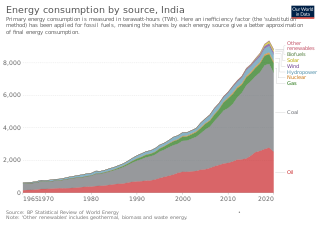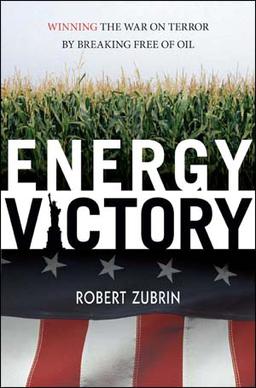
Ethanol fuel is fuel containing ethyl alcohol, the same type of alcohol as found in alcoholic beverages. It is most often used as a motor fuel, mainly as a biofuel additive for gasoline.

Robert Bryce is an American author and journalist based in Austin, Texas. His articles on energy, politics, and other topics have appeared in numerous publications, including the New York Times,Washington Post,Wall Street Journal,Forbes, Real Clear Energy,Counterpunch, and National Review.

Various alcohols are used as fuel for internal combustion engines. The first four aliphatic alcohols are of interest as fuels because they can be synthesized chemically or biologically, and they have characteristics which allow them to be used in internal combustion engines. The general chemical formula for alcohol fuel is CnH2n+1OH.

Brazil is the world's second largest producer of ethanol fuel. Brazil and the United States have led the industrial production of ethanol fuel for several years, together accounting for 85 percent of the world's production in 2017. Brazil produced 26.72 billion liters, representing 26.1 percent of the world's total ethanol used as fuel in 2017.

The United States became the world's largest producer of ethanol fuel in 2005. The U.S. produced 15.8 billion U.S. liquid gallons of ethanol fuel in 2019, and 13.9 billion U.S. liquid gallons in 2011, an increase from 13.2 billion U.S. liquid gallons in 2010, and up from 1.63 billion gallons in 2000. Brazil and U.S. production accounted for 87.1% of global production in 2011. In the U.S, ethanol fuel is mainly used as an oxygenate in gasoline in the form of low-level blends up to 10 percent, and, increasingly, as E85 fuel for flex-fuel vehicles. The U.S. government subsidizes ethanol production.
The United States produces mainly biodiesel and ethanol fuel, which uses corn as the main feedstock. The US is the world's largest producer of ethanol, having produced nearly 16 billion gallons in 2017 alone. The United States, together with Brazil accounted for 85 percent of all ethanol production, with total world production of 27.05 billion gallons. Biodiesel is commercially available in most oilseed-producing states. As of 2005, it was somewhat more expensive than fossil diesel, though it is still commonly produced in relatively small quantities.

Energy in the United States is obtained from a diverse portfolio of sources, although the majority came from fossil fuels in 2021, as 36% of the nation's energy originated from petroleum, 32% from natural gas, and 11% from coal. Electricity from nuclear power supplied 8% and renewable energy supplied 12%, which includes biomass, wind, hydro, solar and geothermal.

The Energy Independence and Security Act of 2007, originally named the Clean Energy Act of 2007, is an Act of Congress concerning the energy policy of the United States. As part of the Democratic Party's 100-Hour Plan during the 110th Congress, it was introduced in the United States House of Representatives by Representative Nick Rahall of West Virginia, along with 198 cosponsors. Even though Rahall was 1 of only 4 Democrats to oppose the final bill, it passed in the House without amendment in January 2007. When the Act was introduced in the Senate in June 2007, it was combined with Senate Bill S. 1419: Renewable Fuels, Consumer Protection, and Energy Efficiency Act of 2007. This amended version passed the Senate on June 21, 2007. After further amendments and negotiation between the House and Senate, a revised bill passed both houses on December 18, 2007 and President Bush, a Republican, signed it into law on December 19, 2007, in response to his "Twenty in Ten" challenge to reduce gasoline consumption by 20% in 10 years.

United States energy independence is the concept of eliminating or substantially reducing import of petroleum to satisfy the nation's need for energy. Some proposals for achieving energy independence would permit imports from the neighboring nations of Canada and Mexico, in which case it would be called North American energy independence. Energy independence is espoused by those who want to leave the US unaffected by global energy supply disruptions and would restrict reliance upon politically unstable states for its energy security.

Energy security is the association between national security and the availability of natural resources for energy consumption. Access to cheaper energy has become essential to the functioning of modern economies. However, the uneven distribution of energy supplies among countries has led to significant vulnerabilities. International energy relations have contributed to the globalization of the world leading to energy security and energy vulnerability at the same time.

Energy independence is independence or autarky regarding energy resources, energy supply and/or energy generation by the energy industry.

Since 2013, total primary energy consumption in India has been the third highest in the world after China and United States. India is the second-top coal consumer in the year 2017 after China. India ranks third in oil consumption with 22.1 crore tons in 2017 after United States and China. India is net energy importer to meet nearly 47% of its total primary energy in 2019.

Food versus fuel is the dilemma regarding the risk of diverting farmland or crops for biofuels production to the detriment of the food supply. The biofuel and food price debate involves wide-ranging views, and is a long-standing, controversial one in the literature. There is disagreement about the significance of the issue, what is causing it, and what can or should be done to remedy the situation. This complexity and uncertainty is due to the large number of impacts and feedback loops that can positively or negatively affect the price system. Moreover, the relative strengths of these positive and negative impacts vary in the short and long terms, and involve delayed effects. The academic side of the debate is also blurred by the use of different economic models and competing forms of statistical analysis.

Energy Victory: Winning the War on Terror by Breaking Free of Oil is a 2007 book by Robert Zubrin. Zubrin's central argument is that the decisive front in the War on Terror is America's struggle for energy independence. He outlines the manner in which Islamic extremism has been financed by oil revenues, the technological feasibility of ethanol-fueled vehicles as well as the economic and agricultural imperatives for ethanol production, and the environmental implications of his plan.
There are various social, economic, environmental and technical issues with biofuel production and use, which have been discussed in the popular media and scientific journals. These include: the effect of moderating oil prices, the "food vs fuel" debate, poverty reduction potential, carbon emissions levels, sustainable biofuel production, deforestation and soil erosion, loss of biodiversity, effect on water resources, the possible modifications necessary to run the engine on biofuel, as well as energy balance and efficiency. The International Resource Panel, which provides independent scientific assessments and expert advice on a variety of resource-related themes, assessed the issues relating to biofuel use in its first report Towards sustainable production and use of resources: Assessing Biofuels. In it, it outlined the wider and interrelated factors that need to be considered when deciding on the relative merits of pursuing one biofuel over another. It concluded that not all biofuels perform equally in terms of their effect on climate, energy security and ecosystems, and suggested that environmental and social effects need to be assessed throughout the entire life-cycle.

The use of biofuels varies by region. The world leaders in biofuel development and use are Brazil, United States, France, Sweden and Germany.

Power Hungry: The Myths of "Green" Energy and the Real Fuels of the Future is a book by Robert Bryce about energy, mainly from a United States perspective. It was published in 2010 by PublicAffairs. A short essay based on the book was released as an op-ed by the author in The Washington Post.

Pipe Dreams: Greed, Ego, and the Death of Enron is a book by Robert Bryce and published in 2002 by PublicAffairs with an introduction by Molly Ivins.
Energy in the Czech Republic describes energy and electricity production, consumption and import in the Czech Republic.

The world's top ethanol fuel producers in 2011 were the United States with 13.9 billion U.S. liquid gallons (bg) and Brazil with 5.6 bg, accounting together for 87.1% of world production of 22.36 billion US gallons. Strong incentives, coupled with other industry development initiatives, are giving rise to fledgling ethanol industries in countries such as Germany, Spain, France, Sweden, India, China, Thailand, Canada, Colombia, Australia, and some Central American countries.

















